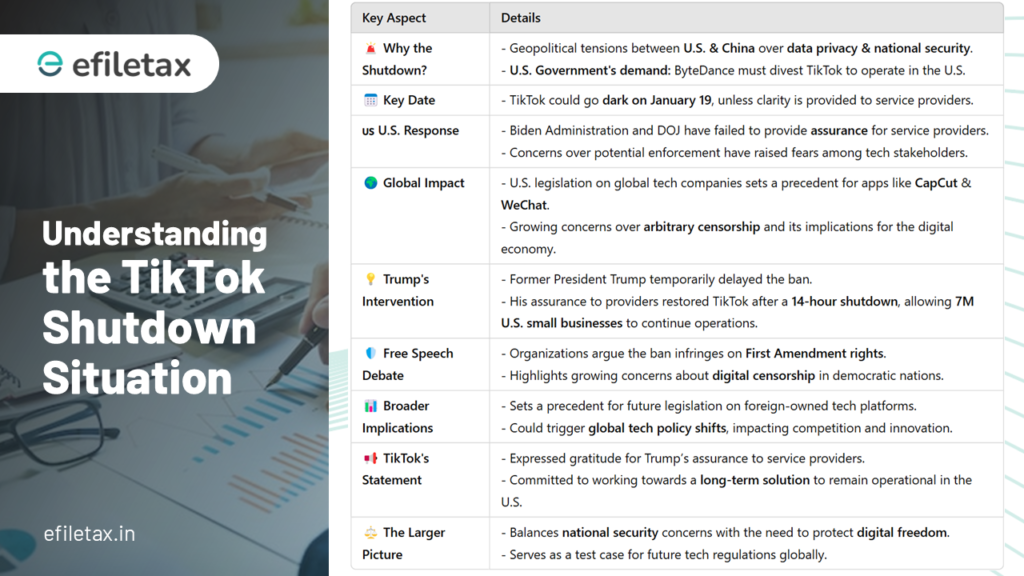
TikTok Shutdown: The Crossroads of Politics and Privacy
The potential shutdown of TikTok Ban in the U.S., announced by both the Biden Administration and the Department of Justice, has sparked intense debate. With over 170 million American users and 7 million small businesses relying on the platform, TikTok’s availability is critical for many. The TikTok ban is deeply tied to concerns over data privacy and national security—issues central to U.S.-China relations.
TikTok Ban
The TikTok ban is not just about one app. It sets a precedent for how digital platforms with international ties could be treated in the future. The app’s temporary shutdown in 2020 serves as a cautionary tale, highlighting how geopolitics can disrupt global tech giants.
🛡️ Data Privacy and National Security
The U.S. government’s push to enforce a TikTok ban stems from concerns that the app, owned by China-based ByteDance, might share user data with the Chinese government. This aligns with broader legislative trends, including the CLOUD Act, which mandates how global companies handle user data.
Case Law Insight
In Van Buren v. United States (2021), the U.S. Supreme Court limited the scope of what constitutes unauthorized access under the Computer Fraud and Abuse Act. This case emphasizes the importance of clear legal standards in the realm of data privacy—a theme central to the TikTok controversy.
🌏 Geopolitical Tensions and Digital Platforms
The TikTok ban highlights the fragility of global tech ecosystems amid geopolitical disputes. The U.S. and China remain at odds, with American legislators wary of apps like TikTok, WeChat, and CapCut. These platforms are seen as potential threats, fueling debates over censorship and sovereignty.
First Amendment Perspective
Advocates like the Foundation for Individual Rights and Expression (FIRE) argue that banning platforms like TikTok risks violating First Amendment rights. In a digital-first world, limiting access to such platforms could suppress speech and creativity.
📈 Impact on Businesses and Users
The 14-hour TikTok shutdown in 2020 sent shockwaves across the U.S., particularly affecting small businesses that rely on the app for marketing. Platforms like TikTok have democratized business opportunities, enabling startups to compete with established brands.
Legal Observations
The case of Packingham v. North Carolina (2017) reaffirmed that digital platforms are a modern public square. Restrictions on their usage could infringe on constitutional rights, emphasizing the need for balanced policymaking.
🔍 Lessons for the Future
- Transparent Policies: Clear communication between governments and tech companies is essential.
- Balanced Legislation: Striking a balance between security and free speech is crucial in shaping digital rights.
- Global Collaboration: A collaborative approach could address concerns while preserving innovation.

🚀 Conclusion
The TikTok ban saga underscores the evolving challenges of governing digital platforms in an interconnected world. By examining the intersection of data privacy, geopolitics, and free speech, we gain valuable insights into the complexities of digital governance.
For more updates on tech policies, compliance, and legal insights, stay tuned to efiletax.in.